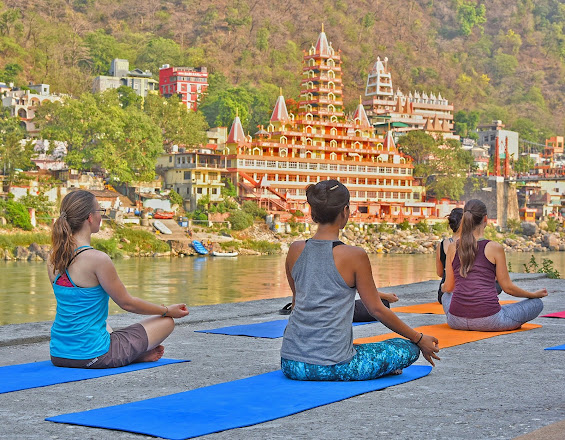Rishikesh
Rishikesh, also listed as Hrishikesh, a city owned by Rishikesh Municipal Corporation (as of October 2017), and tehsil in the Dehradun district of the Indian state of Uttarakhand. Located in the Himalayan hills of northern India, it is known as the "Gateway to the Garhwal Himalayas" and the "Yoga Capital of the World". It lies 21 km (13 mi) north of the city of Haridwar and 45 km (28 mi) southeast of the provincial capital Dehradun. Rishikesh has an estimated population of between 252,533 and 320,222, making it the seventh most populous city in Uttarakhand province. It is known as a pilgrimage city and is considered one of the most sacred places of the Hindu religion. Hindu scholars and saints have visited Rishikesh since ancient times to meditate in search of higher knowledge.
In September 2015, Union Tourism Minister Mahesh Sharma announced that Rishikesh and Haridwar would be the first in India to be renamed the "twin cities of the nation". Because of the religious significance of the area, no food and alcohol are prohibited in Rishikesh at all. The city hosted the annual International Yoga Festival in the first week of March since 1989.
History
Rishikesh has become part of the "Kedarkhand" fame. and Lakmana, his younger brother, crossed the Ganges River, using two jute ropes where 'Lakshman Jhula' (लक्ष्मण झूला) stands today. The 'Kedarkhand' of Skanda Purana, also mentions the presence of Indrakund right now. The rope bridge was replaced by a 248-meter steel suspension bridge in 1889. After the floods of 1924, another solid bridge was installed in 1927 in 1927 by the United States Department of Public Works. The bridge covers the two regions of Tapovan, Tehri and Jonk, Pauri Garhwal. Another similar stopping bridge at Ram Jhula was built in 1986 at nearby Sivananda Nagar.
In modern history, one finds that Rishikesh is mentioned in The Gazeteer of Dehra Dun, by ICS office HG Walton. It reads, "A well-built town or town on the right bank of the Ganges, on a steep cliff overlooking the river.
The Ganges, one of the most sacred rivers to the Hindus, flows through Rishikesh. Here the river leaves the Shivalik hills of the Himalayas and flows into the plains of northern India. Several temples, old and new, lie on the shores of the Ganges in Rishikesh. Shatrughna Mandir, Bharat Mandir (statue of Lord Vishnu), Lakshman Mandir on ancient temples founded by Adi Shankaracharya. Shatrughna Temple is close to Ram Jhula and Lakshman Mandir is near Lakshman Jhula.
Historical records state that some pilgrims lived in Rishikesh as a resting place before moving on to the high mountains where they traveled while a large number often visited Rishikesh as the first place and visited various places between Rishikesh and Lakshman Jhula before returning. However, Rishikesh in recent decades has moved from a tourist to a tourist town. The International Yoga Festival launched in 2000 has brought a new impetus to visitors. Local markets have evolved from the sale of goods such as "local and religious handicrafts" to the tourism industry with a strong focus on services "and provision shops, cafes, hotels and yoga and meditation" and rafting.
Tourism
The city includes the Sivananda Nagar district, the home of Sivananda Ashram and the Divine Life Society founded by Swami Sivananda, north of the city; parts of the temple of Ram Jhula and Lakshman Jhula, in the far north; and the combined ashrams surrounding Swargashram on the east bank. Ganga Arti played in the evening at Triveni Ghat is popular with tourists. The Neelkanth Mahadev Temple, within a forest 28 km (17 mi) from Rishikesh, is a famous local tour, with Vashishtha Guha (Sage Vashishtha Cave), 21 km (13 mi) from the town by the Ganges.
Rafting camps
According to environmentalists, "These camps not only violate the Forest (Conservation) Act 1980, but also the Environmental Protection Act 1986, as well as the Water (Prevention and Control of Pollution) Act 1974, as they continue to pollute the Ganga by evicting pollution, dumping of solid debris directly and seriously damaging the ecological integrity of the river system. "
Environmentalists suspect that the camps, established as temporary shelters, do not have adequate toilets and sanitation facilities, disrupt wildlife habitat and "disturb the peace, tranquility, and tranquility of the jungle."
"In the camps, the owners of the camp allow the workers and visitors to have food and alcohol. They leave empty bottles, cans, junk food and garbage including bones and dirt inside and around the camps. There are still a few other camps with strict policies against the use of alcohol and pollution."
In a 2008 study of maritime camps between Kaudiyala and Rishikesh, experts from the Govind Ballabh Pant Himalayan Environment and Development Institute-R. K. Maikhuri, Nihal Farukhi and Tarun Budhal - found that wildlife conservation standards and practices, especially waste management, were often ignored.
A bench headed by National Green Tribunal Chairman Justice Swatanter Kumar on April 1, 2015 heard a petition filed by the non-governmental organization Social Action for Forest and Environment (SAFE). The National Green Tribunal has sought explanations from the Government of India and the Government of Uttarakhand for the "uncontrolled" operation of rafting camps on the Ganga coast between Shivpuri and Rishikesh in Uttarakhand. The state government has assured the court that it will not grant permission to any new camp until the next hearing in May.
As a precautionary measure against the "National Green Tribunal," a bench headed by Judge UD Salve denied permission to rent camps operating in Rishikesh and criticized the Department of Environment and Forestry (MoEF) and the Uttarakhand Government for not filing their responses and instructed them to file their response.












0 comments